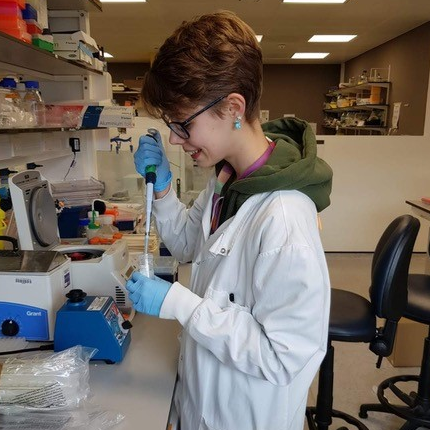Research
5 reasons to share your research with a wider audience
Joanne Sharpe is a final year PhD student at the University of Manchester, who works with Dr Ryan West and Professor Stuart Pickering-Brown. Her research uses fruit fly models to investigate genetic (c9orf72) models of Frontotemporal dementia in the lab.

It’s easy to get lost in the rabbit hole of your research, caught up in troubleshooting the details of your latest experiment and planning the next. It seems like there is an endless maze of new papers to read, lab work to do, and meetings to attend.
We often forget the bigger picture: why are we running an experiment for the umpteenth time and why does it matter so much?
That is why I would encourage you to engage with a wider audience when you can, and share your research further than your scientific colleagues. Here are five reasons why:
1. It will remind you of your passion for science
There is nothing like talking to a lay audience to reignite that flame and passion for your research that might be dwindling due to the repetitive and often frustrating nature of science.
It will remind you why you decided to pursue a scientific career.
Sharing your research with people who are genuinely invested in the outcome and are captivated by what you say is inspiring, and will no doubt give you a burst of motivation on your return to the lab.
2. To remind you why your research is important
It is too easy to forget why we are doing what we are doing or to fall into the trap of thinking we aren’t really making a difference to anyone. We are working on such a tiny piece of the puzzle that we lose sight of the bigger picture. The impact of speaking to a wider audience, in particular those with a lived experience of dementia and its impact, cannot be understated.
It is imperative that we as scientists connect with those who are invested in what we do.
It is sobering and reminds us that what we do is important to real people, not just those few scientists who work in the field.
3. You could get some useful feedback
A wider audience might not give you the same kind of grilling you might get at a scientific conference, but they can ask the most insightful of questions. Don’t be surprised if you are caught off guard by a seemingly naïve but actually pertinent and interesting question.
People who, unlike you, are not immersed in the science day in, day out, offer a different and refreshing perspective on your work, which may even help you when you get back in the lab.
4. It will improve your understanding and ability to explain your research
An underused method to improve your own understanding of the field is to explain it to someone who isn’t a scientist.
Try explaining your research to a family member or friend and you will quickly realise if there are any gaps in your understanding, perhaps hiding behind scientific jargon that you are unable to translate into everyday language.
Preparing and rehearsing a talk for the public will force you to take a step back and drill down into the fundamentals of your research. This is invaluable in developing a clear and concise presenting style.
5. It’s fun!
My experiences of engaging with the public have been so positive that I take every opportunity I can to do it again. Whether it’s at “science fair” type events or giving talks to fundraising groups, it is always entertaining and rewarding to chat to people who are genuinely interested. The look people give me when I explain I work on flies never gets old.
There have even been occasions where I felt that I have made a difference to an individual, most often by reassuring them about concerns they may have from sensationalist headlines in the media.
I hope I have encouraged you to share your research to people outside of the scientific community. Don’t forget that this can be anywhere. It doesn’t have to be a prearranged event; my hairdresser now knows me as the person who dissects fly brains for a living!
Want to share your research?
Are you passionate about sharing your research with people affected by dementia? We hold regular webinars for our Research Network volunteers to bring them closer to our dementia research. Get in touch with anna-louise.smith@alzheimers.org.uk if you're interested in sharing your research with our Network.



